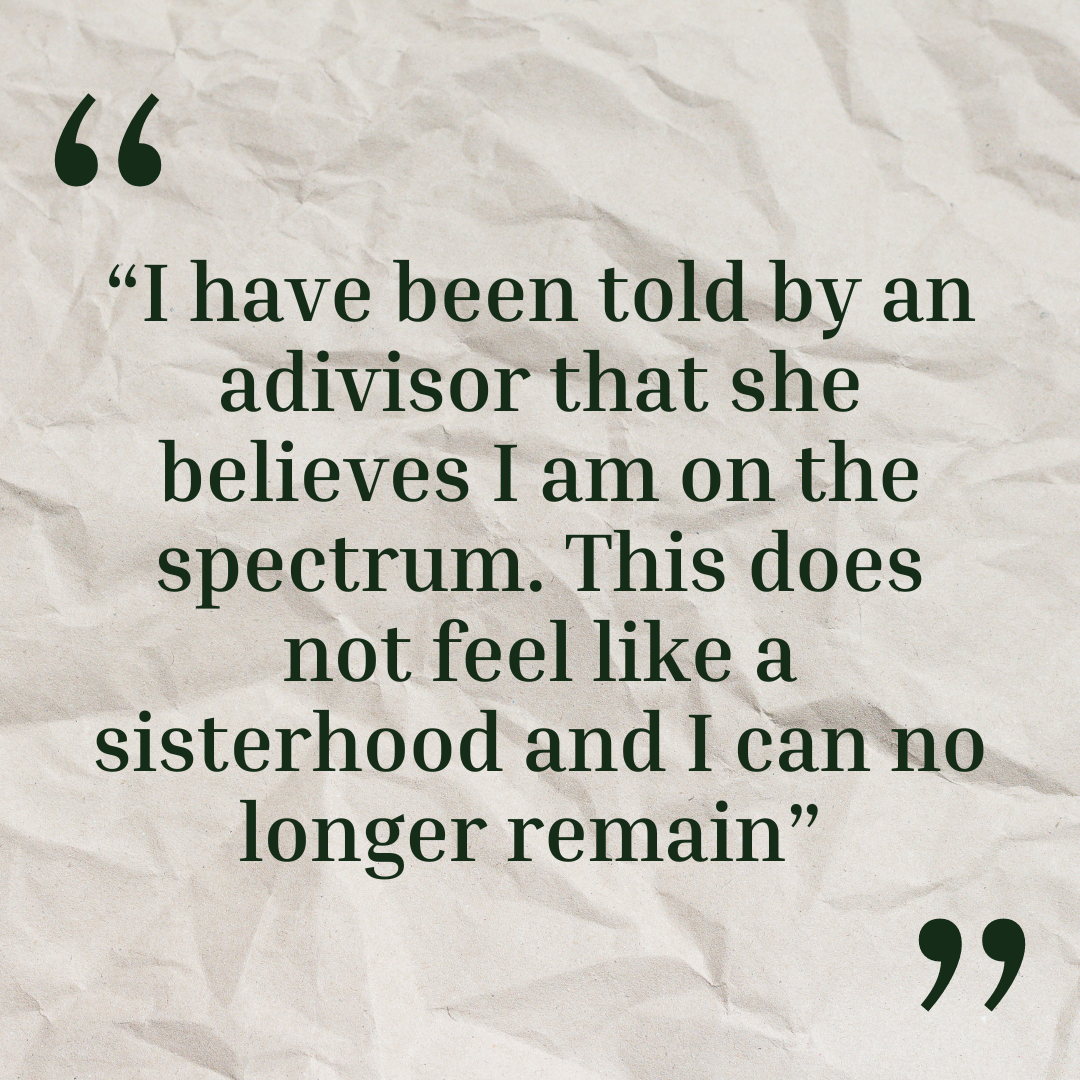On Aug. 28, 2023, following a large decrease in membership, partially credited to allegations made by former chapter members claiming racial profiling and misconduct from Phi Mu advisors and other members, the Kappa Omicron Chapter of Phi Mu sorority disbanded after over half a century of activity on the Armstrong campus.
Three of the former members shared their letters disclosing their grievances with the sorority, which were sent to the Phi Mu national office accompanying their resignation.
Phi Mu Nationals refused to confirm the contents of the letters.
The Inkwell Spoke with two of these former members in an interview after receiving their letters and spoke with an additional member who declined to share their letter but was willing to corroborate the contents of the other letters.
To safeguard the individuals’ concerns of potential social backlash, The Inkwell has chosen to grant anonymity.
Among these letters you will find allegations of:
- A Phi Mu Advisor assigning mental disabilities to members
- Microaggressions directed towards members
“I have been told by an advisor that she believes that I am on the spectrum,” said one former member in their resignation letter. “This does not feel like a sisterhood anymore, and I can no longer remain.”
When questioned about these allegations and the steps that were taken, Phi Mu nationals stated in an email to The Inkwell that “the chapter was not under any sort of probation by the National Fraternity.”
Francisco Lugo, the director of the Georgia Southern Office of Sorority and Fraternity Life, said in an email response that their office received no communication about the allegations from chapter members or the national organization.
Former Phi Mu members detail alleged mistreatment and racial profiling
Every year, members of the Phi Mu chapter leaderboard take a trip to Florida for both training and bonding; it’s referred to as the Phi Mu Officer Academy.
At the event at the beginning of this year, a chapter advisor diagnosed different members who were present with varying mental health disorders based on how they appeared, according to two former members who were present at the event.
Phi Mu Advisors are alumnae, who are there to support the chapter and help implement the chapter’s goals.
“She was going to all of us and saying, what she thought, what mental issues she thought we all had,” said a former Phi Mu chapter.
“She looked at me and she said she can look into my eyes and tell that I’m autistic.”
“Then she had me take an autism test.”
These events were confirmed by another former Armstrong Phi Mu member.
Another former member revealed in their letter that they felt ostracized due to their ethnicity, contributing to their departure.
“When I was a Phi, it was once said that me and my big were only matched together because we had that cultural thing in common,” said the former member in their resignation letter. “At the time, we were the only nonwhite members in the whole chapter.”
“I believe it is in my best interest to remove myself from this organization, as all I have faced in this chapter is prejudiced behavior, emotional stress and social stress.”
Lilly-Ann Henson, the former chapter president at Armstrong, was surprised by the mass withdrawals.
“I never would have seen that coming because of how much they did love it,” said Henson
The Final Chapter
In a press release from Phi Mu national headquarters, repping the tagline “steadfast in sisterhood,” it was stated that the “collegiate chapter members requested this,” and they would seek to reinstate the chapter in the future if interest arises.
An email response from Jackie Gilpin Isaacson, Director of Communications at Phi My National Headquarters, confirmed that close to half their rank withdrew their membership this year prior to closing the chapter.
“At the start of the spring 2023 semester, Phi Mu at Armstrong had 27 total collegiate members; 7 of those were on ICMS (Interim Status) for the spring semester,” said Isaacson. “By the end of the spring 2023 semester, 14 members voluntarily withdrew their Phi Mu membership and five members graduated.”
By the first month of the fall semester, the sorority had announced its closure.
In interviews with The Inkwell, former members cited seeking friendship and community as reasons for joining.
“I was really worried about making friends in college, and so I see sororities on social media and everything and it looked like so much fun,” said the former member. “And it looked like everyone was having a great time, and I was like, I want to be a part of that.”
“I did really love it. At the beginning, I was super excited.”






